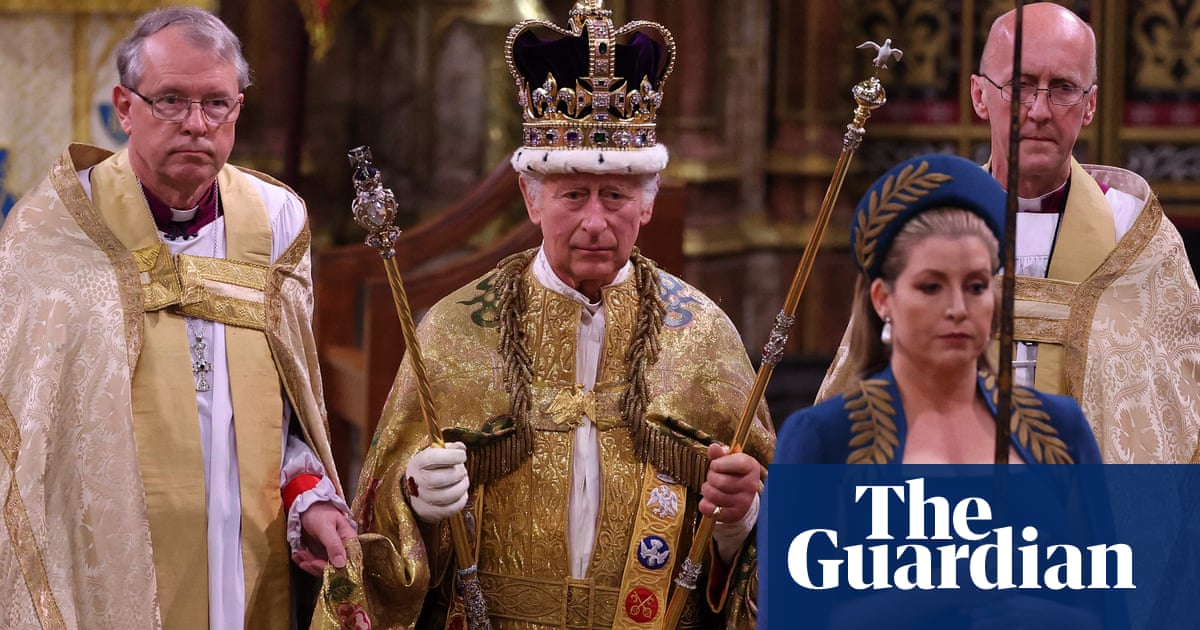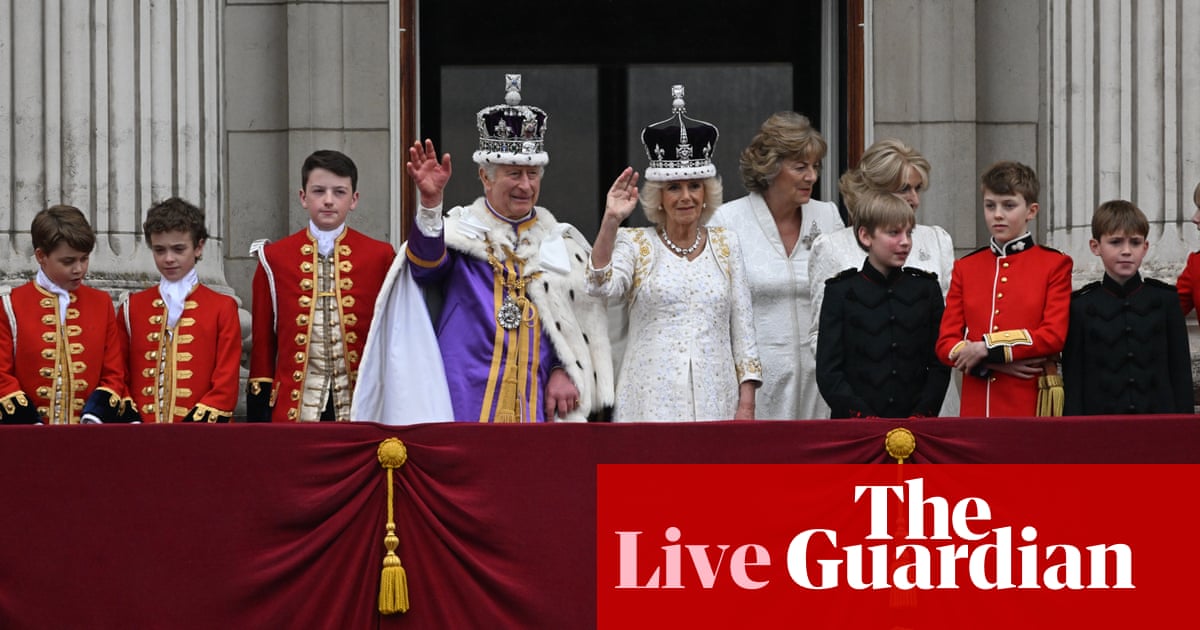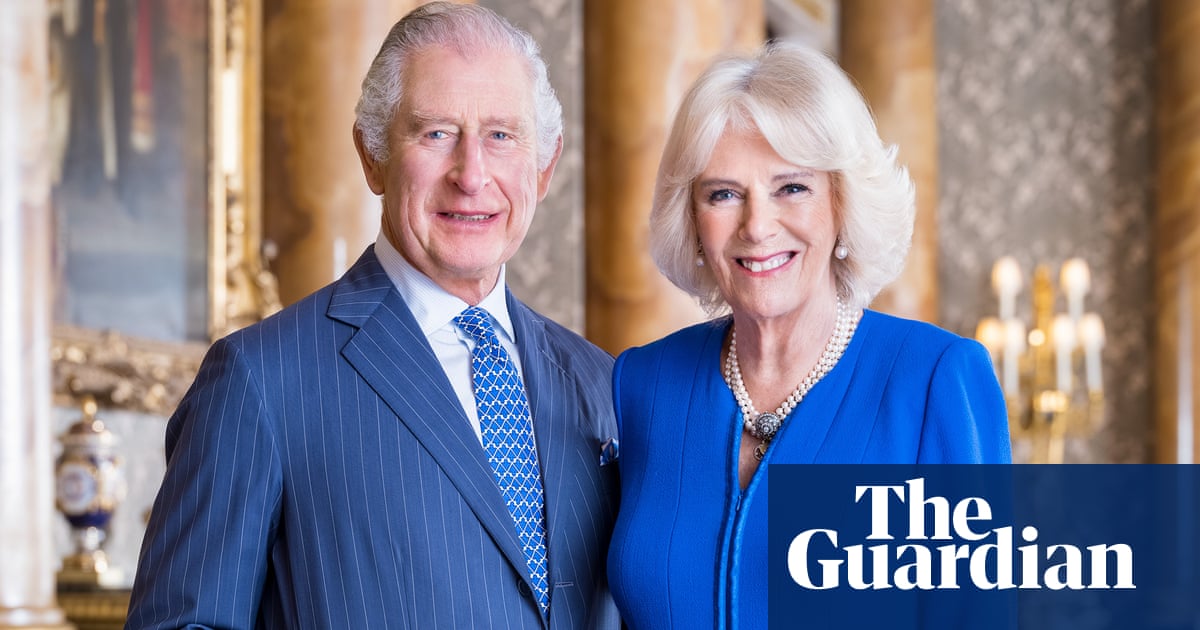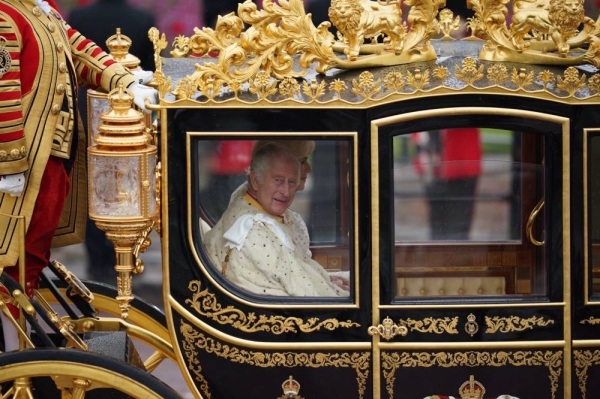
King Charles III and Queen Camilla have been crowned at Westminster Abbey, marking the symbolic beginning of a new royal era in Britain, and an extraordinary moment for a man who has spent more than seven decades in waiting.
In an elaborate and archaic ritual not seen in Britain since 1953, the king was anointed with holy oil and swore the oath of kings, before the archbishop of Canterbury, Justin Welby, placed St Edward’s crown on his head, to a cry of “God save the king”.
In front of 2,300 guests including more than 100 heads of state, the king also vowed to maintain the Protestant religion in the UK, and to preserve the rights of the Church of England, as set out in an act of parliament.
Tens of thousands of people crammed into the Mall and along a procession route from Buckingham Palace to the abbey, many camping overnight to secure a good view of the parade. It involved 4,000 armed forces personnel and 19 military bands, the most at any state occasion since the coronation of Queen Elizabeth II.
However, there were accusations of police heavy-handedness after a number of anti-royalist protesters, including the head of the UK’s leading anti-monarchy campaign group, Republic, were arrested before the beginning of the procession. Graham Smith had been collecting drinks and placards for demonstrators at the main site of the protest when he was detained by police on the Strand at about 7.30am.
Up to 2,000 people gathered in Trafalgar Square beneath a statue of Charles I, who was executed in 1649, as they chanted and held yellow placards reading “not my king”. One sign read: “Don’t you think this is a bit silly?”
Peter Tatchell, the human rights campaigner, tweeted a video showing a large barrier erected in front of the protesters to shield them from the royal couple during the procession. “This is not a free country when we do not have the right to freely protest,” he said.
In his oath, the king promised to govern the UK and the 15 Commonwealth countries where he is also head of state according to the law, and to “cause law and justice, in mercy, to be executed”.
But in an acknowledgment the palace and Church of England had misjudged the public mood, there was a last-minute change to the wording of the controversial homage of the people, which had been included for the first time in the ceremony, but which the king’s friend Jonathan Dimbleby said he would find “abhorrent”.
Rather than calling on “all persons of goodwill” in the abbey and at home watching on television to swear to “pay true homage … to their undoubted king”, Welby changed the wording to stress it was a voluntary and personal act.
“I now invite those who wish to offer their support to do so, with a moment of private reflection, by joining in saying ‘God save King Charles’ at the end or, for those with the words before them, to recite them in full,” he said.
There was a small moment of hesitancy as Welby placed the crown on the king’s head, the archbishop checking the crown, which weighs 2.25kg (5lb), was securely placed before letting go.
The Prince of Wales bowed and kissed his father after paying the “homage of royal blood”, in which he declared himself “your liege man of life and limb”. “Thank you, William,” the king appeared to say.
The king’s younger son, Prince Harry, attended the ceremony alone, without his wife, Meghan, and children, Prince Archie and Princess Lilibet. It is the first time the prince has been seen with the royal family since the publication of his autobiography Spare earlier this year, in which he was highly critical of his father, stepmother and brother.
He was seated two rows behind his brother, between Jack Brooksbank, the husband of his cousin Princess Eugenie, and Princess Alexandra, a first cousin of Elizabeth II.
The archbishop said in his sermon that the ceremony was to “crown a king to serve”, and paid tribute both to the king’s lifetime of service and that of many of those present at the ceremony, who included members of community organisations, the armed forces and the emergency services.
For the first time at a coronation ceremony, the newly crowned king was greeted as he left the abbey by representatives of Jewish, Hindu, Sikh, Muslim and Buddhist communities, who said they “[united] … in thanksgiving and in service with you for the common good”.
Though ancient, the coronation ceremony has no legal or constitutional significance, and Charles has been king since the death of his mother last September. Nonetheless, the symbolic ritual was highly significant for a man who, at 74, has been heir to the throne since the age of three.
It also cemented the extraordinary journey of the woman he married in 2005, after the first marriages of both ended in divorce. From youthful royal girlfriend to vilified mistress to Duchess of Cornwall to queen consort – after her coronation, she would be known as Queen Camilla, Buckingham Palace said.
After they returned to Buckingham Palace, Charles and Camilla – joined by family members including the Prince and Princess of Wales, Prince George, Princess Charlotte and Prince Louis, the Duke and Duchess of Edinburgh, and Princess Anne – stepped out into the rain and greeted the crowds below before watching a scaled-back flypast.












